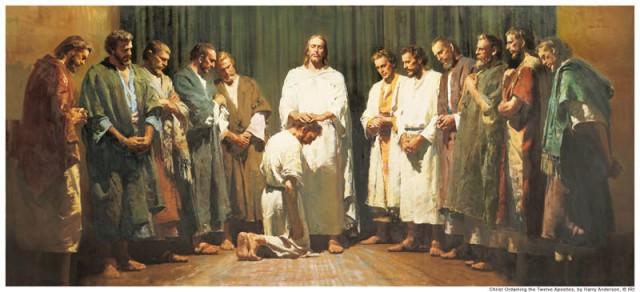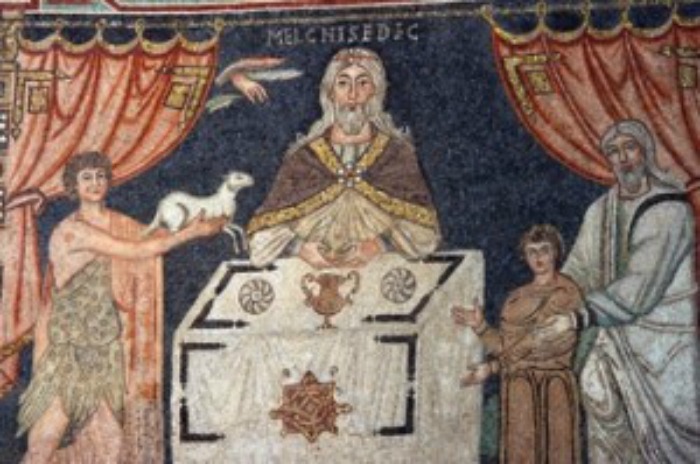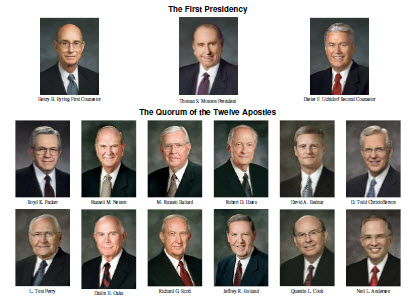Question
Gramps,
My wife is not a member of the Church and last week we were talking about the priesthood. She asked me why we need the priesthood. When Jesus was on earth, he made a new covenant and said we were all priests; therefore, there is no longer a need for the priesthood like it was during the time of the Israelites. I know that’s not what we believe but she said Jesus said it right in the bible. So it got me thinking. I belong to a small branch and asked the question but no answer.
Bruce
Answer
Bruce,
So I’m rather excited to answer the question part of this—why do we need the priesthood—because it’s “awesome” (as the kids say). The part about Jesus supposedly saying there’s no need for the priesthood is less “awesome”, so I’ll address it first. Why is it less awesome? Because Jesus did not say this.
Bible Scriptures about our having the priesthood
I presume your wife is referencing a few scriptures, none of which come from Christ’s life. In 1 Peter 2:9 we read:
“But ye are a chosen generation, a royal priesthood, an holy nation, a peculiar people; that ye should shew forth the praises of him who hath called you out of darkness into his marvellous light:”
And in Revelation 1:6 we read:
“And hath made us kings and priests unto God and his Father; to him be glory and dominion for ever and ever. Amen.”
Also Revelation 5:9-10:
“…for thou wast slain, and hast redeemed us to God by thy blood out of every kindred, and tongue, and people, and nation;
” And hast made us unto our God kings and priests: and we shall reign on the earth.”
Some do interpret these scriptures to mean that we are all priests, and therefore have no need for a restored priesthood. I find that a pretty big stretch. For example, we can also read in Exodus 19:6:
“And ye shall be unto me a kingdom of priests, and an holy nation. These are the words which thou shalt speak unto the children of Israel.”
So here we read during the time of the Israelites that they will be a kingdom of priests, and yet, as your wife pointed out, they did have the priesthood, and we also know that it was not given to every single person. It was restricted only to the Levites. So if they were a kingdom of priests even though not all of them had the priesthood, how is it that the same cannot be applied to the New Testament scriptures?
Understanding the Priesthood
To understand these scriptures we need to understand “the priesthood” and its meaning. In the most literal sense, priesthood means a body of priests. But we also specifically define it as, 1. the power of God, and 2. “In mortality, the priesthood is the power and authority that God gives to man to act in all things necessary for the salvation of God’s children.” (Church Handbook 2: Administering the Church. Priesthood Principles).
If you simply go with the dictionary definition of what the priesthood is, the meaning of the Bible can be muddled. Without latter-day revelation on the matter, one might misunderstand what it means to be a kingdom of priests, a royal priesthood.
The order of the priesthood is the kingdom of God. All who join His kingdom are a part of that priesthood. In this manner, all who gain the right to join His kingdom in the end of times are priests (or priestesses) and are a part of this royal priesthood. For it is Christ’s priesthood. He stands at the head, and those who enter in by the gate and do as He would have them are a part of His order. More specifically, the highest order of the priesthood is the marriage covenant. D&C 131:1-3
“In the celestial glory there are three heavens or degrees;
And in order to obtain the highest, a man must enter into this order of the priesthood [meaning the new and everlasting covenant of marriage];
And if he does not, he cannot obtain it.”
This applies to women as well, of course. To obtain the highest degree of glory men and women must join the highest order of the priesthood. It is, specifically, through this means that we, as Saints in the last days, are to become a kingdom of priests (and priestesses).
Just to clarify, as there has been some confusion as of late on the issue, this does not mean that women have the priesthood when they get married (meaning the authority and keys of the priesthood), but it does mean that they are part of the order of God, which order is His holy priesthood.
In D&C 76:56, when learning of those who will be celestialized, we learn:
“They are they who are priests and kings, who have received of his fulness, and of his glory;”
The fullness of God’s glory is those who receive all that He has. They are they who attain the highest degree of glory (having entered into the covenant of marriage and remained true to their covenants) and who become priests and kings in the eternities (and, obviously, likewise priestesses and queens).
The Priesthood given in New Testament times
When Jesus was on the earth, he did give the higher priesthood (Melchizedek Priesthood) to Peter. The Bible, as is sometimes the case, is not as clear on this without other scriptures, but it is there. For example, we read in Matt 16:18-19:
“And I say also unto thee, That thou art Peter, and upon this rock I will build my church; and the gates of hell shall not prevail against it.
“And I will give unto thee the keys of the kingdom of heaven: and whatsoever thou shalt bind on earth shall be bound in heaven: and whatsoever thou shalt loose on earth shall be loosed in heaven.”
Priesthood is the “keys of the kingdom of heaven”. This ability to bind on earth and have it bound in heaven is what we know to be the sealing power, a distinct function of the priesthood. The idea that Jesus just randomly proclaimed all people on the earth priests doesn’t make sense, of course. But even reading the scriptures that all members of Christ’s Church would be priests does not logically preclude the need for some sort of ordination to that priesthood. It simply does not read that we don’t need the priesthood.
We also learn of the need for the restoration of all things in Acts 3:19-21:
“Repent ye therefore, and be converted, that your sins may be blotted out, when the times of refreshing shall come from the presence of the Lord;
“And he shall send Jesus Christ, which before was preached unto you:
“Whom the heaven must receive until the times of restitution of all things, which God hath spoken by the mouth of all his holy prophets since the world began.”
And then, of course, there’s Mark 3:14 which speaks of the twelve actually being ordained:
“And he ordained twelve, that they should be with him, and that he might send them forth to preach,”
And then in Acts 14:23, giving further evidence of actual ordination to the priesthood, we read:
“And when they had ordained them elders in every church, and had prayed with fasting, they commended them to the Lord, on whom they believed.”
These clues in the Bible help us to see that not only was the priesthood given by Jesus when He established His Church on the earth, but also the need for the restoration of it in the last days.
Difficulty in understanding without revelation and modern scripture
Of course, those who do not accept the truthfulness of the gospel and the clarity provided by latter-day revelation may well read these verses differently. Without a testimony of the Church of Jesus Christ of Latter-day Saints, one is unlikely to believe these things, and to debate with them (what we might call “Bible bashing”) is not very useful.
The concept that we don’t need the priesthood is partially borne from a misunderstanding of the scriptures. Hebrews 7 is the great New Testament chapter on priesthood. Paul wants to emphasize that they are under a greater covenant administered by a greater authority. To illustrate, he uses some exegesis to show that:
- Melchizedek (and his order) was greater than Abraham (and his order).
- Only Levites (under Abraham’s order) held the priesthood.
- The Levitical order was incomplete.
- Given (2), Christ was under a different order, which the Psalms state is that of Melchizedek.
- For additional support of (1) and (3), Paul launches into a comparison of the two and shows that:
- The Levitical does not require an oath, whereas the Melchizedek was given with an oath.
- The Levitical must offer regular sacrifices to atone for personal and national sin; the Melchizedek only requires a single sacrifice forever.
All this supports Paul’s argument that the covenant or testament that came with Christ is greater than the covenant that was given to Moses (under Abraham), which as he points out elsewhere grants the presence of angels but not the presence of God.
For the sake of this conversation, both parties agree that Hebrews 7 shows that there was a change to the covenant and the priesthood order.
Additionally, the Great Commission also comes into play in this discussion. To the apostles, Christ gives the charge “Go ye into all the world, and preach the gospel to every creature. He that believeth and is baptized shall be saved; but he that believeth not shall be damned.” He then shares what we understand to be the gifts of the Spirit: “And these signs shall follow them that believe; In my name shall they cast out devils; they shall speak with new tongues; They shall take up serpents; and if they drink any deadly thing, it shall not hurt them; they shall lay hands on the sick, and they shall recover.”
Considering how even within the true Church we have members who mistakenly believe that these privileges are reserved solely for those ordained to the priesthood, you can see how easily it can be supposed that these signs signify the reception of a universal priesthood.
Why do we need the priesthood?
When discussions occur about the power of the priesthood in a typical Sunday School class, inevitably (at least in my experience) the examples given are about healing the sick. What this tells me is that most people do not seem to understand why the priesthood was so important.
First, healing the sick, while certainly a function of the priesthood, is not dependent on the priesthood (at least not according to the meaning of the priesthood keys and authority given to man on earth—it is dependent on the power of God). Miracles come by faith.
“For if there be no faith among the children of men God can do no miracle among them; wherefore, he showed not himself until after their faith.”
Secondly, and more importantly, as wonderful a blessing as healing the sick is, healing from physical infirmity is not requisite to salvation. In the end, when we stand before Christ on the judgment day, the physical weaknesses will only have matter as to how we deal with them spiritually. Those who went their whole lives with physical suffering or infirmities will not be held back in any regard by those mortal issues. So what will matter? Our willingness to comply to the principles and ordinances of the Gospel.
We know that only those born of the water and the spirit can enter the kingdom of God. Without baptism, we cannot be saved. Baptism is a priesthood ordinance.
This is the true power of the Priesthood. It is the power to save souls through the ordinances of the gospel. Without the priesthood, there can be no baptism, no gift of the Holy Ghost, no temple work, and no eternal marriage. That was the true glory of the restoration of the priesthood. That is the marvelous work we take upon ourselves through the mission of the church. That is why we preach the gospel to the world—to bring to them the saving ordinances required to return to the Father.
Truly Joseph Smith described the glory of this best when he wrote in an epistle to the Saints (D&C 128:19-21)
“Now, what do we hear in the gospel which we have received? A voice of gladness! A voice of mercy from heaven; and a voice of truth out of the earth; glad tidings for the dead; a voice of gladness for the living and the dead; glad tidings of great joy. How beautiful upon the mountains are the feet of those that bring glad tidings of good things, and that say unto Zion: Behold, thy God reigneth! As the dews of Carmel, so shall the knowledge of God descend upon them!
“And again, what do we hear? Glad tidings from Cumorah! Moroni, an angel from heaven, declaring the fulfilment of the prophets—the book to be revealed. A voice of the Lord in the wilderness of Fayette, Seneca county, declaring the three witnesses to bear record of the book! The voice of Michael on the banks of the Susquehanna, detecting the devil when he appeared as an angel of light! The voice of Peter, James, and John in the wilderness between Harmony, Susquehanna county, and Colesville, Broome county, on the Susquehanna river, declaring themselves as possessing the keys of the kingdom, and of the dispensation of the fulness of times!
“And again, the voice of God in the chamber of old Father Whitmer, in Fayette, Seneca county, and at sundry times, and in divers places through all the travels and tribulations of this Church of Jesus Christ of Latter-day Saints! And the voice of Michael, the archangel; the voice of Gabriel, and of Raphael, and of divers angels, from Michael or Adam down to the present time, all declaring their dispensation, their rights, their keys, their honors, their majesty and glory, and the power of their priesthood; giving line upon line, precept upon precept; here a little, and there a little; giving us consolation by holding forth that which is to come, confirming our hope!”
Gramps







